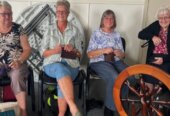
By Julie Guest
Vicar, Parish of St John’s Anglican Church
2021 has arrived. Admittedly it was a fairly subdued arrival but I was surprised by the prevalent, “Let’s leave the horrors of 2020 behind us,” commentary of the final days of 2020.
The change of date was not going to change the effects of the pandemic. And so it has proven. A couple of weeks into 2021 and two new variants of Covid 19 are spreading rapidly, sending countries back into hard lockdown, despite promising vaccines being delivered as fast as possible.
So what have we learned from the effects of a deadly virus on our planet? First, let me say that I believe there is much yet to learn. Already there is a growing scholarly body of writing on the topic, from the study of human resilience across the world, new inventions, ways of “gathering,” ways of delivering education and “going” to work.
But I think the key lesson has been that Jesus was right when he said, “Love others as you love yourself.” (Matthew 2: 39) This pandemic has taught us that it is in fact the only way we will be able to continue life as we know it. If we love others as we love ourselves we have a far better chance at making it through 2021 than if we don’t. Caring for ourselves in this pandemic means doing all the tracking, hygiene, masking and isolating we are asked to do.
Caring for others also means doing all the tracking, hygiene, masking and isolating we are asked to do.
We know we have an advantage in New Zealand because our small population means that when some chose to follow their own desires and disregard the lockdown rules, the subsequent outbreaks, although threatening, were small enough to contain by placing one part of our country under movement restrictions.
Those instances showed how vulnerable we can be. How acting as individuals, caring only for ourselves, can lead ourselves and others into misery. Instead, when we believe (rightly) that by denying ourselves the pleasures beyond our front door we are helping thousands of others to stay well and be protected, we find ourselves part of something bigger than our own world. We are contributing to the greater good.
Psychologist Martin Seligman in The Optimistic Child quotes a survey conducted each decade from 1920 throughout America. The research showed that even during the severe American depression of the 1930’s, people were markedly happier than in the following decades. During the depression people abandoned individualistic approaches and actively cared for each other. They considered that they were contributing to the greater good of all people, and were happy.
This is what Jesus’ message of love for ourselves and one another points to. Jesus makes it clear that we will thrive when we live in community, acknowledging that each of us is designed to be a part of the whole and that Jesus’ love is our connection.
Our future as a country and a planet will depend on how well we into this truth.








